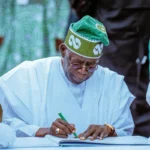The ECOWAS Parliament is exploring potential solutions following the exit of the Sahelian countries:Mali, Burkina Faso, and Niger, as it convenes in Banjul, The Gambia, to discuss the implications and chart a path forward after the withdrawal of these three member states from the Economic Community of West African States (ECOWAS).
The 4th Deputy Speaker of the ECOWAS Parliament, Billay Tunkara, in his opening speech at the ECOWAS Parliament’s Delocalised Joint Committee on Political Affairs, Peace, Security, and the African Peer Review Mechanism (APRM) in The Gambia, stated that ECOWAS must evolve to remain relevant. He emphasized that this evolution involves more inclusive integration, transparent governance, and tangible projects that improve the daily lives of citizens.
Tunkara expressed concern that the withdrawal of the three member states has serious implications for the region, including a potential erosion of ECOWAS’ voice on the international stage, complications in the fight against terrorism, and growing socioeconomic instability.
He described the simultaneous withdrawal as a wake-up call, urging the community to reflect on why the member states chose to leave and whether ECOWAS has adequately addressed their concerns.
The meeting aims to assess the multidimensional impacts of the withdrawal, explore avenues for continued pragmatic cooperation with the affected countries, and identify structural reforms to prevent further exits. Tunkara called on parliamentarians to approach their work with courage and creativity, guided by the spirit of fraternity that founded the community.
“We must come away with concrete proposals for the future, notably a common understanding of the challenges, bold recommendations to maintain dialogue with the affected countries, and reform proposals to consolidate ECOWAS,” Tunkara said.
Also delivering an opening statement, the Speaker of the Gambian National Assembly, Fabakary Tombong Jatta, highlighted the importance of the meeting, stating that the withdrawal of the three member states is a stark reality that demands frank and often uncomfortable discussions.
He said, “The theme under which this meeting is convened is not merely a topic for discussion; it calls for a deeper introspection of the founding principles of ECOWAS and an evaluation of how well these principles are meeting the wishes and aspirations of our citizens.”
Jatta noted that the meeting aims to examine the political, socio-economic, and humanitarian impacts of the withdrawal and explore ways to uphold the ideals of ECOWAS.
He also underscored the potential consequences of the withdrawal, including disruptions to trade routes, economic downturns, and increased security vulnerabilities for coastal states.
Jatta added that the split has profound implications for the African Union’s broader integration agenda and challenges the core principle of regional integration as a means to achieve continental unity.
Nonetheless, he expressed optimism that the meeting would produce resolutions that strengthen parliamentary diplomacy and promote constructive engagement with the Sahel states.
ALSO READ: Alake pledges support for UniAbuja’s gemology & gemstone department
He therefore urged participants to approach their deliberations with urgency, commitment, and determination, bearing in mind that the hopes and aspirations of millions of ECOWAS citizens rest on their shoulders.
In his goodwill message, the Gambian Minister of Foreign Affairs, Dr. Mamadou Tangara, commended the ECOWAS Parliament for choosing The Gambia as the venue for the meeting, which coincides with the 50th anniversary of ECOWAS.
Tangara emphasized the importance of regional unity and integration, invoking the vision of the founding fathers of ECOWAS and the African Union.
He encouraged the committee to reflect on the kind of ECOWAS desired over the next 50 years and to work toward rekindling the spirit of African solidarity and Pan-Africanism.
The minister highlighted the need for pragmatism and strategic engagement with the Sahel states that have withdrawn from ECOWAS, stressing that abandonment is not an option.
He also emphasized the importance of preserving ECOWAS’ achievements over the past five decades, including peace, the free movement of goods and people, and regional coordination on development issues.
Tangara further underlined the importance of participatory democracy, good governance, and human rights, stating that these values should guide ECOWAS’ evolution in the coming decades.
He urged the committee to adopt pragmatic and forward-looking recommendations that prioritize regional unity, integration, and shared prosperity.
WATCH TOP VIDEOS FROM NIGERIAN TRIBUNE TV
- Let’s Talk About SELF-AWARENESS
- Is Your Confidence Mistaken for Pride? Let’s talk about it
- Is Etiquette About Perfection…Or Just Not Being Rude?
- Top Psychologist Reveal 3 Signs You’re Struggling With Imposter Syndrome
- Do You Pick Up Work-Related Calls at Midnight or Never? Let’s Talk About Boundaries







